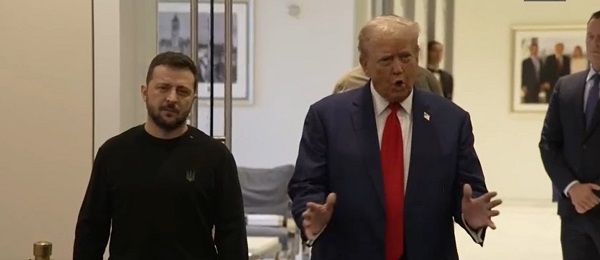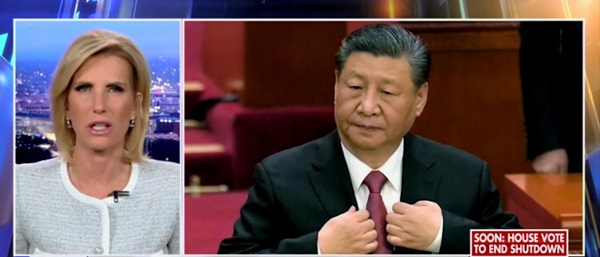Daily Caller
Trump’s Apparent About-Face On Ukraine May Not Be The Change It Seems, Experts Say


From the Daily Caller News Foundation
President Donald Trump’s apparent change in tune towards Ukraine shouldn’t be taken solely at face value, and may actually serve another purpose to further pressure all parties to come to the table, foreign policy experts told the Daily Caller News Foundation.
Trump issued a Truth Social post Tuesday saying that Ukraine was “in a position to fight and WIN all of Ukraine back in its original form,” and that he would continue sending NATO weapons to use in Ukraine. While many in the mainstream media characterized his statement as a notable “pivot,” experts told the DCNF that Trump may be giving Ukraine and Russian President Vladimir Putin one last chance to end the war on peaceful terms, after which Trump may stand strongly behind Ukraine or wash his hands of the conflict altogether.
“I think it’s a tactical shift, but I don’t think his strategic purpose has changed,” George Beebe, director of grand strategy at the Quincy Institute for Responsible Statecraft, told the DCNF. There are parties that insist that it must be a battlefield victory, and there are those in Russia that believe that it ought to be a battlefield victory. His answer to them is, ‘okay, you don’t want to compromise? Go ahead, pursue your battlefield victory,’ and that’s one that I don’t think any of these people have really grappled with the reality of what that really means for them.”
Dear Readers:
As a nonprofit, we are dependent on the generosity of our readers.
Please consider making a small donation of any amount here.
Thank you!
“If you read carefully, he talks about NATO as if it’s some separate entity to the United States,” Beebe told the DCNF. “I think the Europeans could not have failed to pick that up. And that by itself is, from Europe’s point of view, very concerning. And Trump basically said, ‘Okay, Europe, go ahead. Go to it. You defeat this paper tiger of Russia.’ But don’t expect … the United States to come running to defend you when the Russians shoot back at you.”
The White House has claimed that Trump’s statements towards Ukraine are part of a larger negotiating tactic. Trump has continued to pressure nations buying Russian oil to change their petroleum supply, most recently urging Turkish President Tayyip Erdogan during their Oval Office meeting Thursday.
Wilson Beaver, senior policy advisor for defense budgeting and NATO policy at the Heritage Foundation, told the DCNF that his insistence on pursuing these trade negotiations surrounding the Ukraine war is evidence that Trump is nowhere near done with attempting to broker peace.
“One thing I would point to that shows just how committed he is: the tariffs put on India,” Beaver told the DCNF. “India has been making a lot of money buying oil from the Russians, and we’ve nicely asked them to stop for the past three years, and they haven’t. President Trump was frustrated with that, and he acted to try to get the Indians to stop funding Russia’s war in Ukraine, and this has had some follow-on negative effects for the U.S.-India relationship.”
When asked a question Tuesday on whether or not the president still trusted Putin to come to the peace table, Trump told reporters to wait “a month from now.” Trump also said that he would back NATO allies if Russia decided to expand its war to the rest of Europe.
This month, Russia has violated violated the airspace of Poland and Estonia multiple times, prompting condemnation from Europe and increased readiness among NATO nations for any potential escalation with Russia. Whatever Trump’s tactics are, Beaver believes his course remains steady despite perceived rhetorical changes.
“He’s very committed to a peace deal, a cease fire for Ukraine,” Beaver told the DCNF. “I think it was always in the cards that different tactics might have to be used to reach that end state, but the goal is the same.”
Business
Will Paramount turn the tide of legacy media and entertainment?


From the Daily Caller News Foundation
The recent leadership changes at Paramount Skydance suggest that the company may finally be ready to correct course after years of ideological drift, cultural activism posing as programming, and a pattern of self-inflicted financial and reputational damage.
Nowhere was this problem more visible than at CBS News, which for years operated as one of the most partisan and combative news organizations. Let’s be honest, CBS was the worst of an already left biased industry that stopped at nothing to censor conservatives. The network seemed committed to the idea that its viewers needed to be guided, corrected, or morally shaped by its editorial decisions.
This culminated in the CBS and 60 Minutes segment with Kamala Harris that was so heavily manipulated and so structurally misleading that it triggered widespread backlash and ultimately forced Paramount to settle a $16 million dispute with Donald Trump. That was not merely a legal or contractual problem. It was an institutional failure that demonstrated the degree to which political advocacy had overtaken journalistic integrity.
Dear Readers:
As a nonprofit, we are dependent on the generosity of our readers.
Please consider making a small donation of any amount here.
Thank you!
For many longtime viewers across the political spectrum, that episode represented a clear breaking point. It became impossible to argue that CBS News was simply leaning left. It was operating with a mission orientation that prioritized shaping narratives rather than reporting truth. As a result, trust collapsed. Many of us who once had long-term professional, commercial, or intellectual ties to Paramount and CBS walked away.
David Ellison’s acquisition of Paramount marks the most consequential change to the studio’s identity in a generation. Ellison is not anchored to the old Hollywood ecosystem where cultural signaling and activist messaging were considered more important than story, audience appeal, or shareholder value.
His professional history in film and strategic business management suggests an approach grounded in commercial performance, audience trust, and brand rebuilding rather than ideological identity. That shift matters because Paramount has spent years creating content and news coverage that seemed designed to provoke or instruct viewers rather than entertain or inform them. It was an approach that drained goodwill, eroded market share, and drove entire segments of the viewing public elsewhere.
The appointment of Bari Weiss as the new chief editor of CBS News is so significant. Weiss has built her reputation on rejecting ideological conformity imposed from either side. She has consistently spoken out against antisemitism and the moral disorientation that emerges when institutions prioritize political messaging over honesty.
Her brand centers on the belief that journalism should clarify rather than obscure. During President Trump’s recent 60 Minutes interview, he praised Weiss as a “great person” and credited her with helping restore integrity and editorial seriousness inside CBS. That moment signaled something important. Paramount is no longer simply rearranging executives. It is rethinking identity.
The appointment of Makan Delrahim as Chief Legal Officer was an early indicator. Delrahim’s background at the Department of Justice, where he led antitrust enforcement, signals seriousness about governance, compliance, and restoring institutional discipline.
But the deeper and more meaningful shift is occurring at the ownership and editorial levels, where the most politically charged parts of Paramount’s portfolio may finally be shedding the habits that alienated millions of viewers.The transformation will not be immediate. Institutions develop habits, internal cultures, and incentive structures that resist correction. There will be internal opposition, particularly from staff and producers who benefited from the ideological culture that defined CBS News in recent years.
There will be critics in Hollywood who see any shift toward balance as a threat to their influence. And there will be outside voices who will insist that any move away from their preferred political posture is regression.
But genuine reform never begins with instant consensus. It begins with leadership willing to be clear about the mission.
Paramount has the opportunity to reclaim what once made it extraordinary. Not as a symbol. Not as a message distribution vehicle. But as a studio that understands that good storytelling and credible reporting are not partisan aims. They are universal aims. Entertainment succeeds when it connects with audiences rather than instructing them. Journalism succeeds when it pursues truth rather than victory.
In an era when audiences have more viewing choices than at any time in history, trust is an economic asset. Viewers are sophisticated. They recognize when they are being lectured rather than engaged. They know when editorial goals are political rather than informational. And they are willing to reward any institution that treats them with respect.
There is now reason to believe Paramount understands this. The leadership is changing. The tone is changing. The incentives are being reassessed.
It is not the final outcome. But it is a real beginning. As the great Winston Churchill once said; “Now this is not the end. It is not even the beginning of the end. But it is, perhaps, the end of the beginning”.
For the first time in a long time, the door to cultural realignment in legacy media is open. And Paramount is standing at the threshold and has the capability to become a market leader once again. If Paramount acts, the industry will follow.
Bill Flaig and Tom Carter are the Co-Founders of The American Conservatives Values ETF, Ticker Symbol ACVF traded on the New York Stock Exchange. Ticker Symbol ACVF
Learn more at www.InvestConservative.com
Daily Caller
Laura Ingraham’s Viral Clash With Trump Prompts Her To Tell Real Reasons China Sends Students To US


From the Daily Caller News Foundation
On Monday, Ingraham pressed Trump on why a plan to admit 600,000 Chinese nationals into U.S. universities qualifies as a “pro-MAGA” move, challenging him directly after he defended the influx as vital to maintaining Washington’s relationship with Beijing. During a Wednesday broadcast, Ingraham said no modern president has fought harder for American workers than Trump and predicted he will “honor that distinction for the next three years.”
“There was also more consternation over the approach to allowing Chinese and other foreign students to take spots at U.S. universities. A lot of MAGA folks didn’t like that at all. And it’s not, by the way, as some Chinese influencers today said on X, I love this, it’s not that the MAGA folks, certainly not myself, dislike the Chinese people. It’s ridiculous,” Ingraham said.
“What they dislike is the Chinese system that represses Chinese people and uses them as human spies and saboteurs. Remember, when the CCP greenlights hundreds of thousands of their people to come study here, they’re not sending them so they can learn about the wonders of Western civilization, Plato and Socrates, Greek history, become champions of individual freedom and take that message back home. They’re sent here to do whatever is necessary to learn how to push the People’s Republic closer to crushing America, to stealing from us, and for spying on us,” Ingraham added.
Ingraham said that people “understandably perplexed by some of the president’s comments, we cannot forget, what American president has ever been tougher on China than Donald Trump? None.”
Ingraham told viewers that Beijing does not send its students to America to study the Western canon or return home as advocates of individual liberty.
WATCH:
Ingraham warned that China’s rise didn’t happen overnight, saying that decades of inattentive presidents allowed Beijing to gain the strength Trump now must confront.
“Given China’s growing strength that’s been amassed over decades of presidents who were out to lunch, President Trump inherited the most challenging situation,” Ingraham said. “I don’t think it’s an exaggeration to say this, that any president has faced in the last 50 years. He and his entire team are dedicated to countering the Chinese aggression that’s building.”
Washington and Beijing struck a deal in June clearing the way for Chinese nationals to enroll in American universities, a shift that followed the administration’s June 5 move blocking Harvard from bringing in additional international students. Officials justified the restriction by pointing to security vulnerabilities and rising campus turmoil, including allegations of antisemitic activity, as reasons to tighten the flow of foreign applicants.
Trump acknowledged at the time that admitting large numbers of students from a country controlled by the Chinese Communist Party carries real intelligence concerns, saying in June that the government “must be vigilant” about who enters U.S. classrooms. National security experts told the Daily Caller News Foundation that the policy could create openings for the CCP to exploit America’s higher-education system and potentially endanger U.S. interests.
-

 COVID-192 days ago
COVID-192 days agoMajor new studies link COVID shots to kidney disease, respiratory problems
-

 Addictions18 hours ago
Addictions18 hours agoCanadian gov’t not stopping drug injection sites from being set up near schools, daycares
-

 International1 day ago
International1 day agoIs America drifting toward civil war? Joe Rogan thinks so
-

 Business18 hours ago
Business18 hours agoParliamentary Budget Officer begs Carney to cut back on spending
-

 International1 day ago
International1 day agoBondi and Patel deliver explosive “Clinton Corruption Files” to Congress
-

 International1 day ago
International1 day agoState Department designates European Antifa groups foreign terror organizations
-

 International1 day ago
International1 day agoUS announces Operation Southern Spear, targeting narco-terrorists
-

 Censorship Industrial Complex1 day ago
Censorship Industrial Complex1 day agoEU’s “Democracy Shield” Centralizes Control Over Online Speech









